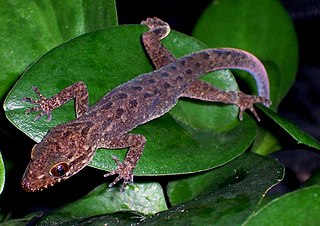
Gekkonidae is the largest family of geckos, containing over 950 described species in 62 genera. The Gekkonidae contain many of the most widespread gecko species, including house geckos (Hemidactylus), the tokay gecko (Gekko), day geckos (Phelsuma), the mourning gecko (Lepidodactylus), and dtellas (Gehyra). Gekkonid geckos occur globally and are particularly diverse in tropical areas. Many species of these geckos exhibit an adhering ability to surfaces through Van der Waals forces utilizing intermolecular forces between molecules of their setae and molecules of the surface they are on.

Goniurosaurus is a genus of geckos, containing 25 species. Members are known by various names including ground geckos, tiger geckos, leopard geckos, and cave geckos Members of this genus are found in China, Japan, and Vietnam. For this reason they are known commonly as Asian geckos. They belong to the family Eublepharidae.

Asaccus is a genus of geckos, commonly known as Southwest Asian leaf-toed geckos, in the family Phyllodactylidae.

Gekko is a genus of Southeast Asian geckos, commonly known as true geckos or calling geckos, in the family Gekkonidae. Although species such as Gekko gecko are very widespread and common, some species in the same genus have a very small range and are considered rare or endangered.

Gehyra is a genus of geckos in the family Gekkonidae. They are known as web-toed geckos or dtellas, and most species within the genus bear close resemblance to geckos from the genus Hemidactylus.

Hemidactylus is a genus of the common gecko family, Gekkonidae. It has 195 described species, newfound ones being described every few years. These geckos are found in all the tropical regions of the world, extending into the subtropical parts of Africa and Europe. They excel in colonizing oceanic islands by rafting on flotsam, and are for example found across most of Polynesia. In some archipelagoes, cryptic species complexes are found. Geckos like to live in and out of houses. They have been introduced to many areas around the world.

Hemiphyllodactylus is a genus of geckos ranging from India and China southward to Southeast Asia and Oceania. Species of Hemiphyllodactylus are commonly known as half leaf-fingered geckos. Many species are known as dwarf geckos or slender geckos.

Cyrtodactylus is a diverse genus of Asian geckos, commonly known as bent-toed geckos, bow-fingered geckos, and forest geckos. The genus has 361 described species as of 2024, which makes it the largest of all gecko genera.

Cyrtopodion is a genus of lizards in the family Gekkonidae (geckos), with 25 described species.

Tropiocolotes is a genus of geckos, lizards in the family Gekkonidae. The genus is native to North Africa and the Middle East. Species in the genus Tropiocolotes grow to a total length of about 2 in (5.1 cm). They are commonly known as dwarf geckos, pygmy geckos, or sand geckos. They have an elongated body and the head is oval and of equal or lesser width than the body.

Diplodactylus is a genus of geckos of the family Diplodactylidae from Australia. They are sometimes called stone geckos or fat-tailed geckos. Member species are morphologically similar but genetically distinct.

Gekkoninae is a diverse subfamily of the family Gekkonidae, geckos. It has the most species and genera — over 850 species in 30 genera. Hemidactylus and Cyrtodactylus together account for 185 species.

Heteronotia binoei, known commonly as Bynoe's gecko, is a species of lizard in the family Gekkonidae, and is endemic to Australia. One of the continent's least-habitat-specific geckos, it occurs naturally across much of the country, and has also established in areas where it does not occur normally, such as urban Perth, Western Australia. It is dark brown to reddish-brown, depending on the colour of the ground upon which it lives, as well as irregular light bands with dark edges along its back.

Lucasium is a genus of lizards, sometimes called ground geckos, in the family Diplodactylidae. The genus is endemic to Australia, and it includes 14 species.

Gekko nutaphandi is a species of gecko, a lizard in the family Gekkonidae. The species is endemic to Thailand.

The black Pilbara gecko is a species of gecko. It is endemic to Australia.
Bynoe's prickly gecko is a species of gecko. It is endemic to Australia.

Heteronotia spelea, also known as Pilbara cave gecko, cave prickly gecko, or desert cave gecko, is a species of gecko. It is endemic to Australia.
The Hamersley Range spotted gehyra is a species of gecko in the genus Gehyra. It is endemic to Western Australia. It was first described in 2018.
The Burrup Peninsula rock gehyra is a species of gecko in the genus Gehyra. It is endemic to Western Australia. It was first described in 2018.

















